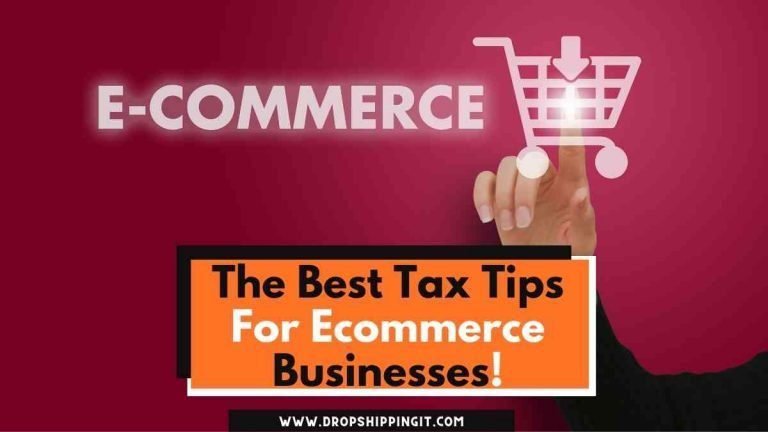As an ecommerce business owner, it’s important to be aware of the tax implications of your transactions. Here are som of the best Tax Tips for Ecommerce Businesses that have helped most ecommerce store owners sell online and stayed complaints as they keep most of their money.
There are several ways to keep more of your hard-earned money in your pocket, and we’re here to share some tips!
In this article, we will discuss the most common tax issues faced by ecommerce businesses and provide advice on how to deal with them.
So read on for information that could help save you a lot of money!
One of the most important things to remember as an ecommerce business owner is that you are responsible for collecting and remitting sales tax on all of your transactions.
This includes both online and offline sales, so it’s important to know the laws in your state or country. Depending on your location, you may also be required to collect and remit VAT or GST.
What is An Ecommerce sales tax?
Sales tax for ecommerce can be a bit confusing because there are so many different rules and regulations for each state. In general, you are required to collect sales tax from your customers if you have nexus in that state.

Nexus is generally defined as having a physical presence in the state, such as a store, office, or warehouse. If you have nexus in a state, you must collect and remit sales tax to the state.
Best Ecommerce Sales Tax Software
Online software programs are available to help you manage sale tax compliance that is fully automated, saving on paying a bookkeeper or accountant. Examples of these sales tax software include:
- Avalara – IDC MarketScape names this tax automation software a leader in Saas and cloud-enables sales and use tax automation software for small and midsize businesses.
- TaxJar – This cloud-based platform automates the entire sales tax life cycle across all sales channels, from calculations and nexus tracking to reporting and filing the appropriate tax forms.
- Vertex – Manage compliance accurately and effectively with this end-to-end software solution.
You may also be responsible for collecting and remitting use tax if you sell physical goods.
This is a tax on items used or consumed in your state but purchased from a business outside of the state. As with sales tax, online software programs can help you use tax compliance, such as the tax software listed above.
Another common tax issue faced by ecommerce businesses is determining the correct classification for your products.
The Harmonized Tariff Schedule (HTS) is a system used by customs authorities to classify goods and determine import duties and taxes. The HTS is divided into 21 sections, further divided into 96 chapters.
Each chapter contains a list of commodities and their corresponding tariff classifications.
It’s important to correctly classify your products because the classification determines the rate of duty that will be applied to your goods when imported into the country.
If you misclassify your products, you may pay more in duties and taxes than you should.
For example, you can find the HTS classification for your products by using the online search tool on the US Customs and Border Protection website.
If you’re shipping goods to customers in other countries, you must be aware of their customs regulations.
Each country has its own rules and regulations, and it’s your responsibility to ensure you’re compliant. Failure to do so could result in confiscating your goods, or you may even be subject to criminal penalties.
Some countries have what’s known as a de minimis value, which is the value of goods imported into the country without paying duties or taxes.
For example, the de minimis value in the United States is $800. This means that if you’re shipping goods worth less than $800 to a customer in the US, you won’t have to pay any duties or taxes on those goods.
However, not all countries have a de minimis value, so it’s important to check the customs regulations for the country you’re shipping to.
You can find this information on the website of the country’s customs authority.
Regarding taxes, ecommerce businesses have a lot to keep track of.
But by being aware of your obligations and taking advantage of available resources, you can ensure that you’re compliant and avoid penalties.
If you’re selling products subject to excise tax, such as alcohol or tobacco, you’ll need to comply with all applicable laws and regulations.
Excise taxes can be complicated, so it’s a good idea to seek professional help if you’re unsure how to handle them.
Finally, if you’re running an ecommerce business, keeping good records of all your transactions is important.
This will help if the IRS or other tax authorities ever audit you. Keeping accurate records will also make it easier to prepare your taxes yearly.
Now let’s handle some of the FAQs about the Tax tips for Ecommerce Businesses that most e-commerce store owners ask.
Frequently Asked Questions
1. What are the tax implications of selling online?
Generally, the same tax rules apply to online sales and sales made through brick-and-mortar stores.
However, there are a few key considerations for ecommerce businesses to keep in mind.
First, if you sell products or services online that are subject to sales tax, you must collect and remit the tax to the appropriate state and local tax authorities.
This is true regardless of whether you have a physical presence in the state where the sale occurs.
Second, if you have nexus in a state (i.e., you have a physical presence or are otherwise doing business there), you may be required to collect and remit taxes even if the sale is made to a customer in another state.
Many states have what is known as “use taxes,” which apply to purchases of taxable goods and services made from out-of-state sellers.
Third, if you are an out-of-state seller without nexus in the state where the sale occurs, you may still be required to collect and remit tax if the state has what is known as an “affiliate nexus” law.
These laws require out-of-state sellers to collect and remit tax if they have certain connections to the state, such as through affiliates or other third parties.
Finally, it’s important to note that even if you are not required to collect and remit tax on a particular sale, the customer may still be responsible for paying the tax. This is known as “use tax” and is generally collected by the state when the customer files their individual income tax return.
2. Do I need to charge sales tax on shipping and handling fees?
In some states, shipping and handling fees are considered part of the “sales price” of the product and are therefore subject to sales tax. In other states, these fees are considered separate from the sales price and are not subject to sales tax.
3. Do I need to charge sales tax on digital products?
In some states, digital products are subject to sales tax, while in others, they are not. However, even if a state does not currently require a sales tax on digital products, this could always change in the future as more states are beginning to adopt “cloud tax” laws.
4. Do I need to charge sales tax on services?
In some states, services are subject to sales tax, while in others, they are not. However, even if a state doesn’t currently require a sales tax on services, this could change in the future as more and more states begin to adopt so-called “service tax” laws.
5. Do I need to collect sales tax if I only sell through my website or online store?
If you have nexus in a state (i.e., you have a physical presence or are otherwise doing business there), you may be required to collect and remit taxes even if the sale is made through your website or online store. This is because many states have what are known as “use taxes,” which apply to purchases of taxable goods and services made from out-of-state sellers.
6. Do I need to collect sales tax if I only sell to customers in other countries?
No, you are not required to collect and remit sales tax on purchases made by customers in other countries.
However, some countries may require you to collect and pay VAT (Value Added Tax) or other similar taxes.
7. Do I need to collect sales tax if I am a nonprofit organization?
In general, nonprofit organizations are exempt from sales tax. However, this exemption may not apply to all sales made by the organization, such as sales of taxable goods and services.
Additionally, some states require nonprofits to obtain a sales tax exemption certificate before claiming it.
8. Do I need to collect sales tax if I am an out-of-state seller?
If you have nexus in a state (i.e., you have a physical presence or are otherwise doing business there), you may be required to collect and remit taxes even if you are based out of state.
Many states have what is known as “use taxes,” which apply to purchases of taxable goods and services made from out-of-state sellers.
In addition, some states require out-of-state sellers to obtain a sales tax permit before they can begin collecting and remitting taxes.
Tax Tips for Ecommerce Businesses Conclusion
By following these money-saving tips, you can help ensure that your ecommerce business stays compliant with tax laws and regulations. By keeping more of your hard-earned money in your pocket, you’ll be able to invest back into your business and continue growing!
Thank you fo reading Tax Tips for Ecommerce Businesses,it is our hope you’ve learned a thing or two from this guide.
Start Shopify For Only $1 A Month
Sign Up Now and Get your first 1st month for only $1 with 3 days free trial.

Sharing this information with others can make a huge difference. You may ask why.
Well, the truth is, my main aim is to provide the best information about drop shipping for both beginners and experienced dropshippers.
And I plan to continue doing so for as long as I can.
I would also like to thank those who support my work by reading and sharing my content.
Trust me, when you take your time to share, it will greatly help me and others who need this information.
Here are some great suggestions:
- Pin it
- Share it on another blog.
- Share on Facebook (Share it with friends and even on Facebook groups)
- Tweet it
- Stumble it
This will only take a few seconds of your time, and I would appreciate it.
I appreciate you a lot. Thank you!
Join my Shopify dropshipping group mastermind and follow my blog to learn more about Shopify tips, dropshipping guides, tricks and checklists, and e-commerce in general.
If you enjoyed and learned something from this post, you can get me updates for free!
I send out email newsletters about new blog posts, tips, and tricks to help you grow your dropshipping business, new YouTube videos to give you more insights into the e-commerce market, and much more.
Click here to Join My Facebook Mastermind Group

